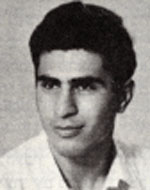Shabtai, son of Aliza and David, was born on April 26, 1951 in Haifa. Since his father was a career soldier, the family used to migrate from town to town several years later, Elementary school in Ashkelon and ended in Kiryat Haim near Haifa, and his elementary school teacher told him: “Shabtai was the embodiment of all the good in the world, all the tenderness. When he laughed, I saw in his smile the perfection of grace and grace. “Little prince” we called him in the teachers’ room.. He would weigh every word he uttered. He was serious, courteous, obedient, talented, diligent and noble. All the good qualities in man were integrated into this boy. He never boasted. He never complained. If he was hit by one of his friends, he did not ask that he be punished. If he happened to hit, and always unintentionally, he would hurry and ask for forgiveness. Shabtai was not a “friend” according to the concepts of the youth. Everyone loved him and respected him and his place in society was reserved for him thanks to his education and integrity. “Shabtai often tells his relatives and friends, and everyone has a similar opinion to that of his teacher ..Shabtai grew up in a warm home, where the relations between the parents and the children were healthy and Yaffa; he used to travel with his father in his places of work, and when he was a child he decided that when the day came he would choose a military career. Learn to appreciate and love the heritage of Israel and nurture great and Yaffa dreams about the greatness and military and spiritual strength of the State of Israel. He was an excellent athlete – especially in the fields of athletics and goal-scoring – played chess in the Kiryat Haim department, and during his free time read many books – especially concentrating on reading Hebrew literature. To the military school near the Reali School in Haifa, where Shabtai was drafted into the IDF in early August 1969 after successfully completing his studies at the boarding school. He was assigned to the Armored Corps, and during his service he passed many courses with great success. He completed his tank commander course as an outstanding trainee, and in addition he took courses in tank, tank, tank, infantry, armored, and artillery. When the time came for his release in early August 1971, he volunteered for career service, which he did until the day of his death. In the booklet of the battalion, the battalion commander says: “On October 18, 1973, Shabtai led his company to cross the Suez Canal in order to undergo a traffic attack inside Egyptian territory. It was twilight. The Egyptian shelling was heavy and very difficult. The vessel, on which Shabtai’s tank was hit, and the tank fell into the water. In a supreme heroic attempt, Shabtai attempted to extract the gunner from his cell while the tank fell, but his strength did not stand and he died. “Shabtai noticed that the spokesman was about to turn over from the attack and shouted to the crew to rescue himself. He himself did not jump and tried to pull the gunner, who shouted that he had been hit. The tank slid into the water, abandoned the tank and immediately sank into the great whirlpool. After a few seconds I went back to the water. The night was pitch black and accompanied by occasional shelling. I was taken by a rubber boat and I asked which of the staff was in. There were only two of us – the driver and I, Yoav and Shabtai were not there, I shouted and called their names, but no answer came. ” He was brought to eternal rest in the Haifa cemetery. Survived by his parents, two sisters and a brother. .. Someone said ‘still water penetrates deep’ and such was Shabtai. In his quiet manner of speaking and his modest manner, you could not know that this guy had an inexhaustible accumulation of professional knowledge and a highly developed technical sense. During the fighting, a last captive took the avenue, as a rearguard to the company, and made sure to push forward every failed tool. . .. . “In the war, Shabtai was discovered as a cool and courageous officer, and served as a personal example to his soldiers who loved him very much,” says the battalion commander.
